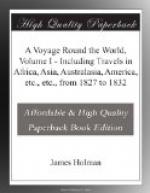Sierra Leone is about six miles within the cape of that name, and lies at the entrance of the river. The town is laid out with great regularity, and the streets are spacious. It is two miles in length near the water-side, and about one mile in width, gradually ascending from the beach to the hills at the back of the town. The intervening space between a short distance beyond the extremity of the town and the summit of the hills is principally unreclaimed forest land, which was originally portioned out amongst the first settlers in the colony. From want of means, however, or some other cause, the colonists never cleared those grounds, nor did they offer them on sufficiently reasonable terms to enable others to do so. This is the more extraordinary, as it is generally supposed that if the wood were removed, it would greatly improve the salubrity of the air in the town and neighbourhood, as well as open a new source of profit to the proprietors, it being already well known that all tropical productions thrive most successfully in this soil. Coffee, cocoa, arrow-root, sugar-cane, &c. have been tried with the utmost success. The houses of the Governor, several of the respectable merchants, and some of the natives, are built of stone. There is a church also, on a very magnificent scale; indeed, so ambitious was the design of this building, that the Colonial Government do not appear to have been able to afford the expense of furnishing the interior, and have accordingly run up an ugly brick wall in the centre, for the purpose of appropriating one half of it to religious duties, and the other to public offices. The church, as it was built, was evidently too capacious for the congregation that was likely to attend the service of the established religion, particularly as a great portion of the population consists of Dissenters, who have men of their own colour and way of thinking for preachers. I have heard some of their black divines, but cannot say that I was much edified by their discourses.
The following extraordinary letter from two master workmen, free blacks, who were employed on the church, received by a Member of Council, while I was on a visit to him, will serve as a specimen of the advancement in education that some of these poor fellows have made. The letter is given literally from the original.
“Sierra Leone, Sept. 18th, 1827.
“Honourable Sir,
“I have the honour of sendin to you this morning with humble manner I was to the Honour D. Denney yesterday, about the trouble what I have, I was take work from the church-yard, and I finish it, the gentlemen I must made petition and I cannot tell who will go to please to help me from this trouble if I will get the money from the gentleman. Shew me the way for get the money by your Honour all the people what I hired I do not know how to do with myself—only you one I know because I was under your brother if any trouble to much for me I cry to you with humble manner I am poor black man—
“I remain
Your affectionately and obedient servant,




